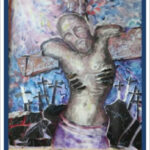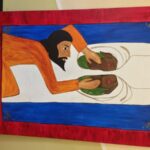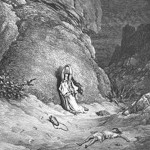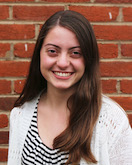Learning about autism, communication, and theologies of disability…
Encountering and learning from women who have experienced exploitation…
Confronting social injustices and promoting ethnic and socio-economic reconciliation…
These are just a few of the themes of the blog posts by the 2015 Project on Lived Theology summer interns: Caitlin Montgomery, Rachel Prestipino, and Melina Rapazzini.
We invite you to follow them on their powerful journeys this summer through our intern blog here. To be notified when new posts are published, be sure to like us on Facebook and follow us on Twitter @LivedTheology.
Here is a sampling of the PLT Interns’ work:
“Jesus, the disabled God”
by Caitlin Montgomery
 I realized that I’ve been playing into these notions of the “cult of normalcy” even in the way I describe this internship to people. The key line I always used was: “I’m reading and writing about how the Christian church can learn to better serve individuals with disabilities.” This sort of service language only widens the gap between “us normal people over here” and “those disabled people over there.” I no longer think that learning how to better serve people with disabilities is what the Church needs. This is arguably a dangerous attitude which can give us a messiah complex and turn disability into something to be treated rather than a person to be known. I believe what Christians need is nothing less than an entirely new way of thinking about and relating to people, including themselves. This requires a fundamental anthropological shift which privileges mutual vulnerability and interdependence as the new ‘norm.’ Time to cancel that subscription to the cult of normalcy, people. I don’t believe anything less will do.
I realized that I’ve been playing into these notions of the “cult of normalcy” even in the way I describe this internship to people. The key line I always used was: “I’m reading and writing about how the Christian church can learn to better serve individuals with disabilities.” This sort of service language only widens the gap between “us normal people over here” and “those disabled people over there.” I no longer think that learning how to better serve people with disabilities is what the Church needs. This is arguably a dangerous attitude which can give us a messiah complex and turn disability into something to be treated rather than a person to be known. I believe what Christians need is nothing less than an entirely new way of thinking about and relating to people, including themselves. This requires a fundamental anthropological shift which privileges mutual vulnerability and interdependence as the new ‘norm.’ Time to cancel that subscription to the cult of normalcy, people. I don’t believe anything less will do.
To read more of Caitlin’s post, please click here.
“How then shall we live (this theology)?”
by Melina Rapazzini
 I learned something valuable in the body of Christ this past morning in church. I learned the necessity of being confronted with my own racial prejudices particularly within a multiethnic church. I participated in lived theology as a church, a living chaotic body that mysteriously communes together with the Lord. As a structure we were able to acknowledge our broken world, our broken bodies, collectively repent, accept grace, and begin to turn away from our sin. That is the goodness of the church; it has power as a corporate body, given life through individuals, to enact radical change in ourselves and as a body.
I learned something valuable in the body of Christ this past morning in church. I learned the necessity of being confronted with my own racial prejudices particularly within a multiethnic church. I participated in lived theology as a church, a living chaotic body that mysteriously communes together with the Lord. As a structure we were able to acknowledge our broken world, our broken bodies, collectively repent, accept grace, and begin to turn away from our sin. That is the goodness of the church; it has power as a corporate body, given life through individuals, to enact radical change in ourselves and as a body.
The Church has this power. Every week. Far too often we are too cynical, hardhearted, disenchanted, (insert adjective here) to imagine the possibility of genuine individual and structural change. So we half-ass our confessions and repentances, and as a result we cannot help but half-ass working towards the kingdom of God. And people wonder why millennials are leaving the church for humanitarian agencies.
To read more of Melina’s post, please click here.
“The God Who Sees Me”
by Rachel Prestipino
 In her landmark work of womanist theology, Sisters in the Wilderness, Dolores Williams connects the story of Hagar, with which the black community has long identified, to black women’s experience of surrogacy/motherhood, oppression, and survival in the United States. She points out that Hagar is the only character in the entire Bible who has the privilege of naming God. When Hagar flees a second time, this time with her son Ishmael, God enables their survival by helping Hagar find water for her dying child, and “God was with the boy as he grew up” (Gen. 21:20). This God, Williams claims, is different from the “malestream” God of Abraham. She is different even from the God of black (male) liberation theology, who is always portrayed as the Great Liberator of the Exodus, in spite of stories like Hagar’s (in which God’s provision does not come in the form of liberation from slavery). Hagar’s God is not the God whose authority Sarah probably cited when she forced Hagar to be Abraham’s concubine. Hagar’s God is the one who sees her.
In her landmark work of womanist theology, Sisters in the Wilderness, Dolores Williams connects the story of Hagar, with which the black community has long identified, to black women’s experience of surrogacy/motherhood, oppression, and survival in the United States. She points out that Hagar is the only character in the entire Bible who has the privilege of naming God. When Hagar flees a second time, this time with her son Ishmael, God enables their survival by helping Hagar find water for her dying child, and “God was with the boy as he grew up” (Gen. 21:20). This God, Williams claims, is different from the “malestream” God of Abraham. She is different even from the God of black (male) liberation theology, who is always portrayed as the Great Liberator of the Exodus, in spite of stories like Hagar’s (in which God’s provision does not come in the form of liberation from slavery). Hagar’s God is not the God whose authority Sarah probably cited when she forced Hagar to be Abraham’s concubine. Hagar’s God is the one who sees her.
More than anything, I want the Muslim girls in dance class to encounter the God who sees them. This God might not look like “Papa God” or even the “Christian God” as we describe Him. I later heard that two of our girls (who did a similar activity in another one of our dance classes) wouldn’t stop writing letters to God all week long. They were told to write just one, but, as their older sister reported, they didn’t stop there. When I heard this my heart leapt. By writing these letters to God they are interacting with God in an environment that isn’t mediated, or restricted, by us.
To read more of Rachel’s post, please click here.
______________________________

Caitlin Montgomery is a third-year religious studies and speech-language pathology student with a passion for helping children with special needs. While interning at the Virginia Institute of Autism and navigating new methods of behavioral therapy for children with autism, she hopes to explore what it looks like to construct a theological framework that empowers individuals with disabilities.
The Virginia Institute of Autism is dedicated to helping people overcome the challenges of autism through innovative, evidence-based programs in education, outreach and adult services. Learn more about their work at their website.
 Rachel Prestipino is a third year student majoring in religious studies and global development studies. She is particularly interested in notions of human dignity, especially with regard to women, as they are presented by various Christian theologies. She is spending her summer serving women who have experienced violence and exploitation in the Tenderloin neighborhood of San Francisco.
Rachel Prestipino is a third year student majoring in religious studies and global development studies. She is particularly interested in notions of human dignity, especially with regard to women, as they are presented by various Christian theologies. She is spending her summer serving women who have experienced violence and exploitation in the Tenderloin neighborhood of San Francisco.
Rachel is working this summer with the organization Because Justice Matters whose mission is to reach women who are victims of sexual exploitation and domestic violence, and offer support to those experiencing isolation due to economic and cultural challenges. Learn more about their work here.
 Melina Rapazzini is a third year student majoring in religious studies and nursing, which has naturally resulted in a passion for studying the intersection between ethics and direct patient care. A native from the San Francisco Bay Area, Melina is excited to live in in Oakland and work with New Hope Covenant Church to develop a reading, art, and gardening program for inner city refugee children. Melina is mostly looking forward to learning from these children how to see and understand the Kingdom of God in a neighborhood with historically one of the highest rates of robbery in the United States.
Melina Rapazzini is a third year student majoring in religious studies and nursing, which has naturally resulted in a passion for studying the intersection between ethics and direct patient care. A native from the San Francisco Bay Area, Melina is excited to live in in Oakland and work with New Hope Covenant Church to develop a reading, art, and gardening program for inner city refugee children. Melina is mostly looking forward to learning from these children how to see and understand the Kingdom of God in a neighborhood with historically one of the highest rates of robbery in the United States.
The vision of New Hope Covenant Church is to worship God and embody the good news of Jesus through Community, Compassion, Discipleship, and Justice. Learn more about New Hope at this link.
The Summer Internship in Lived Theology offers the unique opportunity to pursue service as an explicitly theological activity. Interns’ reading, writing, and conversation with their mentors enable them to reflect on their work theologically. They spend the summer exploring how service informs and shapes religious belief, and how religious belief informs and shapes service.
Watch this space for highlights, visit the intern blog, and get all the updates by following their summers on Facebook and Twitter.
